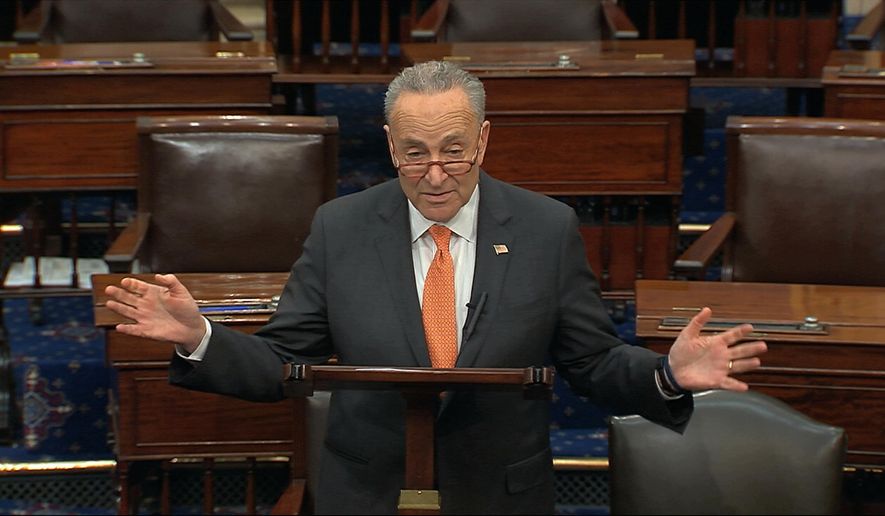Senate Minority Leader Charles E. Schumer on Wednesday touted a deal on a $2 trillion economic rescue package while saying and that lawmakers need to be prepared to do more amid the expanding coronavirus outbreak.
“It is a good bill. Does it have everything we need? No,” Mr. Schumer, New York Democrat, said on CNN’s “New Day.” “But this is the art of compromise. This is the art of coming together.”
He said people don’t know how long the crisis will last and precisely who is affected.
“The unknown is one thing,” he said. “We should be willing [and] able to come back in a bipartisan way and do more if we need it, and I believe we’ll probably have to do that one way or another.”
Staff is still drafting actual legislative text, but negotiators announced the contours of the deal overnight Wednesday.
It calls for $1,200 checks to go out to many Americans, with a cost of $250 billion for that provision.
SEE ALSO: Tom Cotton predicts swift passage of $2 trillion stimulus package
It also includes $250 billion for unemployment insurance, about $367 billion in loans for small businesses to make payroll, $500 billion in loans for corporations, $150 billion for a state and local relief fund, and $130 billion for hospitals.
“I think we will pass it today,” Mr. Schumer said.
Mr. Schumer helped cut the deal along with Senate Majority Mitch McConnell, Treasury Secretary Steven T. Mnuchin and White House legislative affairs director Eric Ueland.
Senate Democrats had twice derailed procedural votes as lawmakers tried to move the process forward, saying a GOP-written bill was tilted too much toward boosting corporations.
House Speaker Nancy Pelosi on Wednesday said a Republican bill offered by Mr. McConnell several days ago was a “non-starter.” House Democrats had countered with their own $2.5 trillion package.
“This bipartisan legislation takes us a long way down the road in meeting the needs of the American people,” said Mrs. Pelosi, California Democrat. “House Democrats will now review the final provisions and legislative text of the agreement to determine a course of action.”
Mr. Schumer said Democrats managed to wring concessions that included additional money for hospitals, strengthened unemployment benefits and additional oversight on “corporate bailouts.”
Democrats had objected to a $500 billion loan fund that would boost corporations, likening it to a “slush fund” and saying it gave Treasury too much discretion to shield details.
Mr. Schumer said Sen. Elizabeth Warren of Massachusetts helped craft oversight provisions on that front. There’s expected to be an inspector general and oversight board akin to what happened with the 2008 bank bailouts.
“The bottom line there is that we will know very shortly after any contract with the Fed or with the Treasury is signed with a company, any loan is made, we will have full details of the loan document,” Mr. Schumer said. “It’ll be published very, very shortly afterwards.”
It’s unclear how quickly the House will be able to move on the package, as members are currently on recess.
Leaders have talked about the possibility of pushing it through via unanimous consent given the urgency of the situation, but objections from just one member could thwart those plans.
Rep. Justin Amash, an independent from Michigan who left the GOP last year, said the package was a “raw deal for the people.”
“It does far too little for those who need the most help, while providing hundreds of billions in corporate welfare, massively growing government, inhibiting economic adaptation, and widening the gap between the rich and the poor,” Mr. Amash said on Twitter.
• David Sherfinski can be reached at dsherfinski@washingtontimes.com.




Please read our comment policy before commenting.